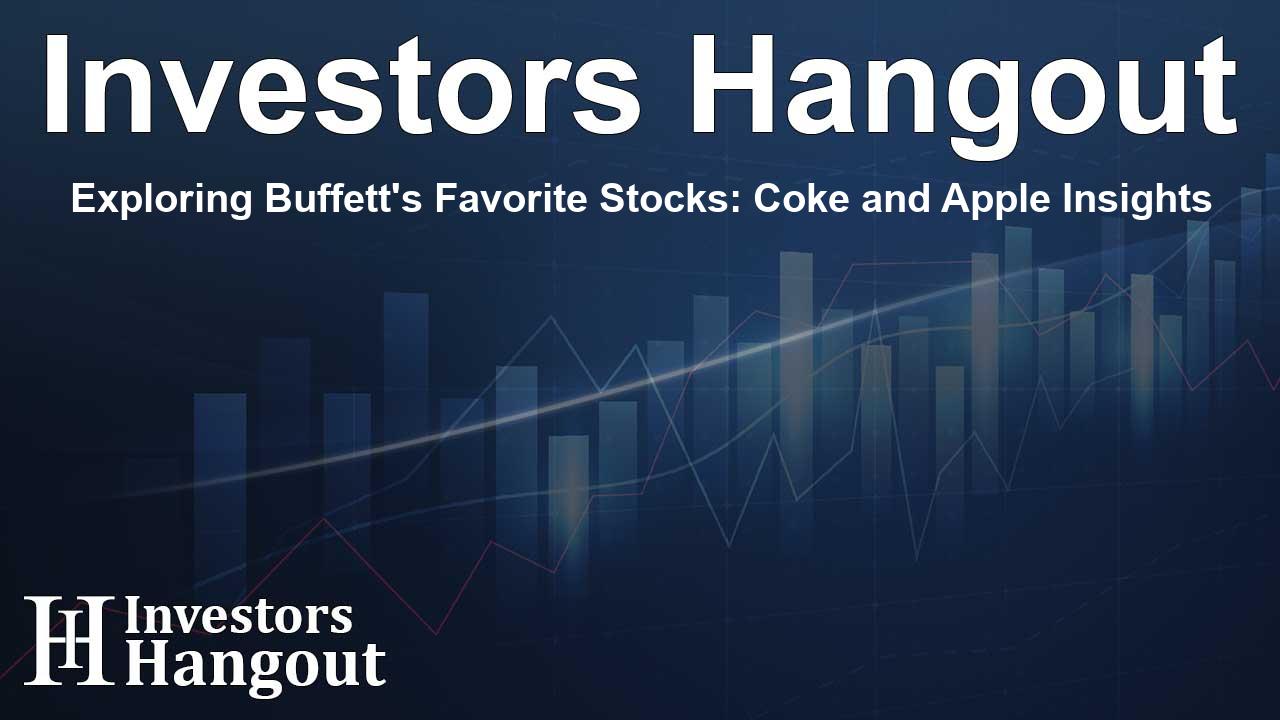Exploring Buffett's Favorite Stocks: Coke and Apple Insights

Warren Buffett's Longstanding Favorite: Coca-Cola
Coca-Cola (NYSE: KO) is a significant part of Warren Buffett's investment strategy. While it isn’t the largest holding in his portfolio, it's definitely one of his favorites, remaining a steady choice over the years. Buffett's relationship with Coca-Cola began back in 1987, and he made hefty investments over a span of seven years, ultimately acquiring an impressive 400 million shares that he has held onto since.
Over the years, Buffett has likened his long-term hold on Coca-Cola to a "Rip Van Winkle slumber," reflecting his deep trust in the brand's future. This legendary company continues to prosper, benefitting from strong earnings and consistently returning dividends to its investors.
Buffett's fondness for Coca-Cola goes beyond just taste; it also stems from the brand's strength, which acts as a protective shield against market competition. This is a key aspect of Buffett's investing philosophy. The reliability of this iconic brand assures him that Coca-Cola will continue to be part of the Berkshire Hathaway (NYSE: BRK.A, NYSE: BRK.B) portfolio.
Apple: A Growing Interest?
Buffett doesn’t just have a cherished spot for Coca-Cola—he's also got his eye on tech giants like Apple (NASDAQ: AAPL). Recently, he made headlines by trimming some of his Apple shares. However, this decision doesn't reflect a waning confidence in the tech powerhouse. It's more of a strategic financial move, possibly in anticipation of tax rate adjustments.
Even after selling off a significant 49% of his Apple shares, it appears that Apple is still likely to be a key player in Berkshire Hathaway's holdings. Buffett’s strategy for acquiring shares takes into account market conditions and the company’s growth potential.
Buffett's Investment Principles
Warren Buffett is well-respected not just for his investment skills, but also for his appreciation of strong leadership, as shown in his views on Apple’s CEO, Tim Cook. At a previous shareholder meeting, Buffett praised Cook as an exceptional leader, particularly for his strategies around share repurchases that enhance existing shareholders' stakes without any extra cost. This clever tactic adds extra appeal for investors.
Additionally, Apple showcases impressive double-digit growth and innovative offerings, making it a formidable force in the tech industry. Recently, Apple achieved a significant milestone by claiming all top seven spots on the list of best-selling smartphones, highlighting its strong brand loyalty and consumer trust.
The Moat of Coca-Cola and Apple
Coca-Cola and Apple both embody an essential element in Buffett's investment philosophy: the concept of an 'enduring moat.' Buffett has emphasized the importance of a financially stable business model that can maintain excellent returns on capital investments. This moat is apparent in both companies' market dominance and their ability to adapt to shifting consumer trends.
Moreover, Apple's dedication to its shareholders mirrors that of Coca-Cola, especially in terms of consistent dividend payments. Since 2018, Apple has maintained an average annual dividend payout of around $775 million. This makes Apple a unique player in the tech sector, despite being a technology-focused company.
The Takeaway: Long-Term Investment Viability
The solid earnings performance, commitment to innovation, and dependable dividend policies of both Coca-Cola and Apple suggest they are likely to continue thriving in the Berkshire Hathaway portfolio and beyond. For those looking for a blend of growth and stability, diversifying with these strong companies could be a wise choice.
As you evaluate your investment prospects, remember the steadfast nature of companies like Coca-Cola and Apple. Both demonstrate the vital components of long-term sustainable success, making them worthy candidates for anyone looking to build a solid investment portfolio.
Frequently Asked Questions
1. Why is Coca-Cola significant in Buffett's portfolio?
Coca-Cola is significant due to its strong brand, reliable earnings growth, and consistent dividends, all of which align with Buffett’s investment approach.
2. Has Buffett reduced his stake in Apple?
Yes, Buffett has reduced his stake in Apple, but this decision was more about strategic tax planning than any lack of confidence in the company.
3. What does Buffett think of Apple’s CEO?
Buffett admires CEO Tim Cook for his outstanding leadership, especially his share repurchase strategies that build shareholder value at no extra cost.
4. How do Coca-Cola and Apple maintain their competitive edge?
Both Coca-Cola and Apple keep strong market positions through brand loyalty, innovative products, and their ability to adapt to changing consumer preferences.
5. Why are dividends important in an investment portfolio?
Dividends provide a reliable income stream, reflecting a company’s fiscal health and commitment to returning profits to shareholders, which is crucial for long-term investment strategies.
About The Author
Contact Addison Perry privately here. Or send an email with ATTN: Addison Perry as the subject to contact@investorshangout.com.
About Investors Hangout
Investors Hangout is a leading online stock forum for financial discussion and learning, offering a wide range of free tools and resources. It draws in traders of all levels, who exchange market knowledge, investigate trading tactics, and keep an eye on industry developments in real time. Featuring financial articles, stock message boards, quotes, charts, company profiles, and live news updates. Through cooperative learning and a wealth of informational resources, it helps users from novices creating their first portfolios to experts honing their techniques. Join Investors Hangout today: https://investorshangout.com/
The content of this article is based on factual, publicly available information and does not represent legal, financial, or investment advice. Investors Hangout does not offer financial advice, and the author is not a licensed financial advisor. Consult a qualified advisor before making any financial or investment decisions based on this article. This article should not be considered advice to purchase, sell, or hold any securities or other investments. If any of the material provided here is inaccurate, please contact us for corrections.
